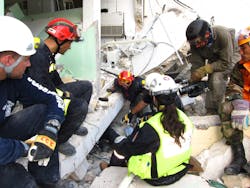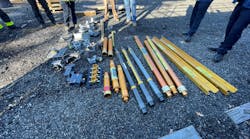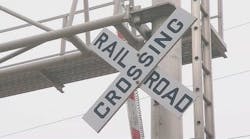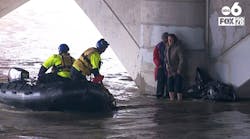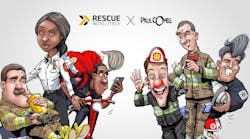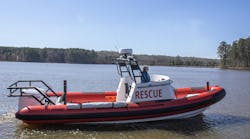_____________________________________
A small rescue team mainly comprised of South Florida firefighters arrived in Haiti on Jan. 14, just a few days after an earthquake decimated the island nation.
"There was just death all around you," West Palm Beach Lt. Nate Lasseur said. "We were there 48 hours later and the smell of death was already there."
Lassuer -- whose family is from Haiti -- runs a charity called International Firefighters Assistance, Inc. that transports donated fire equipment and gear to firefighters there. He was featured on Firehouse.com last year after he helped rescue a young boy from a school collapse in the same town he would arrive in, Port-au-Prince.
The crew also included Lt. Ed Beardsley, Chief Ed Crelin, Lt. Steve Moews and Paramedic Greg Tabeek, all from Delray Beach Fire-Rescue, along Davie Fire-Rescue Capt. Rob Bellazair, Colorado National Guardsmen Rob Rudich and Eric Miller, and Doctor Ginger Vaughan boarded a flight chartered by local developer Frank McKinney, who started the charity, the Caring House Project, which focuses on improving living conditions in Haiti.
During their trip they would rescue three victims who were buried for days in the rubble. They would rescue a mother and her daughter from a collapsed apartment building on Jan. 15, and a male patient buried under the collapsed Doctors Without Walls hospital with a tube still in his chest.
Despite a notice from the USFA urging against response efforts not coordinated with the federal government, McKinney's connections to the military allowed the team to self deploy.
They had the tail numbers of the two planes they flew down in classified as military ones so that -- if possible -- they could land in Port-au-Prince.
Lassuer said that the travel situation was complicated since there were so many planes trying to make their way into Haiti.
"We were up in the air without a real destination before we finally landed."
To allow for better mobility, the team packed light and were equipped with small hand tools including pry-bars, crow bars, sledge hammers, ropes and pulleys.
When they arrived at the UN compound, Lassuer started looking for his family members.
"At night I was looking for family, during the day, I was with the task force," he said.
That first night, he first found his grandfather, and said he was relieved. Later he would find other family members, but upon finding his cousin, learned both of his children had died.
"There were some very challenging moments," he said. "I had to deal with all of those family issues and get back to work the next day … Everyone there had some kind of loss, I couldn't let it get to me."
Lasseur said that while the earthquake devastated the country, there is some good that can come from the tragedy.
"I try to be optimistic about everything," he said. "One good thing is that all eyes are there now. We no longer have to scream.
"You can't have a country with only two fire departments; it can't be done. When they rebuild, I hope that is one thing they fix."
He was previously preparing for his captain training for this month, but says he may decide to put it on the back burner for now.
"It's just not a priority for me anymore, it will come around again," he said.
He was able to speak with Cap-Haitien Fire Chief Ardouin Zephirin by phone after returning home and was updated on the status of the fire service there.
"Most of the guys are fine," he said. "Some lost family members and a lot are homeless. There is damage to the fire stations and everyone is afraid to stay in their homes or go in the stations."
Lasseur's charity is currently working on providing the firefighters tents and temporary housing.
"We're trying to help stabilize their lives so they can continue with their jobs," he said.
You can read more coverage of this rescue team's efforts in this month's issue of Advance Rescue Technology, a supplement to Firehouse Magazine. Click here to view the digital version of the story, which starts on page 10.
